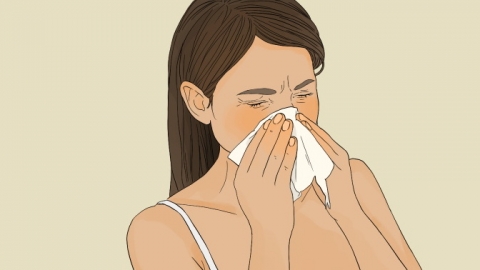What should I do if I keep sneezing and having a runny nose?
Generally, persistent sneezing and runny nose may be caused by inhaling irritants, early-stage cold due to exposure to cold, allergic rhinitis, acute rhinitis, or sinusitis. It is recommended to seek medical attention promptly, identify the underlying cause, and then improve symptoms under a doctor's guidance through general management, medication, and other treatments. Specific causes are analyzed as follows:

1. Inhaling irritants: Inhaling irritating substances such as dust, pollen, or cooking fumes can stimulate the nasal mucosa, leading to sneezing and a runny nose. Immediately move away from the source of irritation and go to an area with fresh air. Use saline solution to rinse the nasal cavity to reduce mucosal irritation and relieve discomfort.
2. Early-stage cold due to exposure to cold: After the body gets chilled, viruses invade the upper respiratory tract, causing nasal mucosal congestion and swelling, resulting in sneezing and clear nasal discharge. Keep warm, drink plenty of warm water, ensure adequate rest, and consider drinking ginger tea appropriately to dispel cold and aid recovery.
3. Allergic rhinitis: Upon exposure to allergens, an abnormal immune response triggers inflammation of the nasal mucosa, manifesting as frequent sneezing and watery nasal discharge. Patients should follow medical advice to use medications such as cetirizine hydrochloride tablets, loratadine syrup, and mometasone furoate nasal spray.
4. Acute rhinitis: Often caused by infection with rhinovirus or adenovirus, acute inflammation of the nasal mucosa leads to sneezing and sticky nasal discharge, possibly accompanied by nasal congestion and sore throat. Patients should follow medical advice to use ribavirin granules, acetaminophen-phenylephrine-dextromethorphan tablets, and oxymetazoline hydrochloride nasal drops to alleviate symptoms.
5. Sinusitis: Nasal inflammation spreads to the sinuses, causing sinus infection, which results in sneezing and yellowish, purulent nasal discharge, often accompanied by headache and reduced sense of smell. Patients should follow medical advice to use cefuroxime axetil tablets, eucalyptus citronellol enteric soft capsules, and budesonide nasal spray for treatment.
In daily life, maintain good indoor ventilation, regularly clean the indoor environment to reduce allergens and dust; adjust clothing according to weather changes when going outdoors to avoid getting chilled; eat a light diet, consume more foods rich in vitamins, enhance physical immunity, and reduce the occurrence of nasal discomfort.





